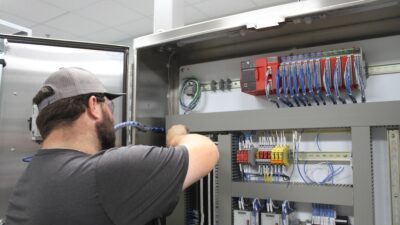When executive officers request live production data, they put production IT managers focused on plant-floor operations in a difficult predicament. To comply, these managers must add tasks to their systems to collect this information. Unfortunately, these additional duties can compromise productivity.
When executive officers request live production data, they put production IT managers focused on plant-floor operations in a difficult predicament. To comply, these managers must add tasks to their systems to collect this information. Unfortunately, these additional duties can compromise productivity.
Requests to harvest live data from manufacturing operations originate from pressing enterprise needs: The accounting department wants to qualify for a new tax credit; the CEO wants to implement a lean manufacturing initiative; or the COO wants the company to comply with new environmental regulations. All these initiatives require real-time production data from plant-floor devices, and these requests have become more frequent.
To satisfy each request, a production manager has to think about the best way to collect information from plant-floor controls and send it to the enterprise. Historically, managers relied on manufacturing execution systems (MES) to perform these tasks. Translators and handlers are assigned to the MES to gather data needed from each piece of equipment.
Constant requests can become a burden as they task the MES to retrieve additional live production data. The MES is optimized for more mission-critical plant operations. Production managers are more focused on getting output from production lines than configuring new data collection tasks. And the dirty little secret about the MES in most environments is the number of these tasks to satisfy noncritical demands that have been placed on it. With the addition of these noncritical demands, many systems struggle at their main task of keeping plant-floor systems operational.
However, if the data could be transported from production to the enterprise via neutral means, the risk of overloading the MES with noncritical tasks is greatly reduced.
Avoiding the use of convoluted middleware on the MES, intelligent transactions through enabled devices allow the production manager to mine needed data without compromising core tasks. By enabling data collection in a safe environment and providing for its easy and secure transportation to the enterprise, tasks are added without taxing MES performance.
| ILS Technology’s deviceWISE enables data collection and delivery of relevant information directly to the consumption point, regardless of where the application resides in the plant or enterprise. |
Moreover, using software with a small code footprint allows information to travel between domains with minimal device bandwidth. Data can be collected from any machine; programmable automation controller (PAC); or programmable logic controller (PLC) through connection to legacy systems, regardless of manufacturer or the network to which it is attached.
Installed in PACs, PLCs, plant systems, or the enterprise IT domain, data paths between the plant floor and enterprise can be established in minutes. Tools for production-to-enterprise connectivity help address multiple requests for live data without burdening the MES.
When corporations establish connections between manufacturing operations and corporate decision makers, they expect real-time data to result. This type information access supports the intelligent decision-making needed for flexible operations. But don’t ask production managers to compromise their operations to get you there.



